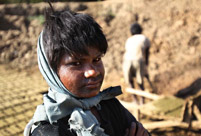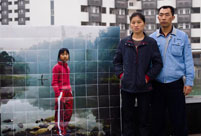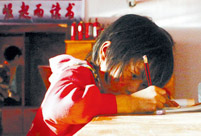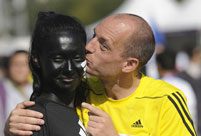NAIROBI, Oct. 25 -- The International Federation of Red Cross and Red Crescent Societies (IFRC) said Friday it's working with governments and other global health agencies to support polio immunization of 35 million children in the Horn of Africa region.
IFRC regional polio advisor John Haskew said despite an immediate multi-country response, the polio virus has continued to spread rapidly throughout the Horn of Africa.
"The current polio outbreak in the Horn of Africa is likely to be prolonged and continue to spread. With our network of community volunteers in each country, the Red Cross and Red Crescent is well placed to support immunization activities," Haskew said in a statement issued in Nairobi.
The relief agency's statement comes after UNICEF said over one million children are yet to be immunized in the Horn of Africa, making the region the largest pocket of under-immunized children in the world.
UNICEF eastern and southern Africa regional polio coordinator Faten Kamel blamed the problem on insecurity, lack of campaign and poor infrastructure to reach rural areas.
"Somalia is the worst affected country in the region followed by South Sudan where most populations are either in refugee camps or are ever moving across the borders," Kamel told journalists in Nairobi on Thursday.
The World Health Organization (WHO) said new cases of the wild polio virus continued to emerge in the Horn of Africa despite ongoing efforts to end the outbreak.
The UN health agency has warned that the outbreak is likely to be "explosive, large of long duration" and spreading more quickly, necessitating "continued urgent and coordination joint action".
The Horn of Africa region has been polio free in recent years but due to low immunization coverage, the region has remained vulnerable to the importations of the wild polio virus.
"In 2009, during polio outbreaks across Africa, 30,000 Red Cross and Red Crescent volunteers were mobilized to support campaigns, helping to reach over 25 million children with polio vaccinations," said Haskew. "When the first cases of polio were reported in Kenya and Somalia earlier this year, Kenya Red Cross and Somali Red Crescent volunteers supported social mobilization and vaccination of children in particularly high risk and inaccessible border areas."
In May, a case of wild polio virus was confirmed in the Benadir region of Somalia. A week later another case was reported in the Dadaab refugee camp in Kenya.
Six new cases were reported in the past week (4 in Somalia and 2 in Ethiopia), bringing the total number of cases in the Horn of Africa to 197 (174 in Somalia, 14 in Kenya, 6 in Ethiopia and 3 in South Sudan).
"There is no cure for polio, but there are safe and effective vaccines. The strategy to eradicate polio is based on preventing infection by immunizing every child until transmission stops," Haskew said.
"We must work quickly and effectively to support vaccination efforts and control this Horn of Africa outbreak," said the advisor.
According to IFRC, neighboring countries of Djibouti, Eritrea and Uganda remain at significant risk, adding that it's working with government ministries of health and partners to support immunization of more than 35 million children across seven countries in the Horn of Africa.
"Planned Red Cross Red Crescent support to national rounds of polio immunization activities include micro planning and mapping of villages and communities in remote and inaccessible areas, education and mobilization of communities for immunization, and campaign surveillance using mobile phone technology," it said.
The agency said several Red Cross Red Crescent community-based volunteers are well placed to help promote vaccination in the region.
Trained volunteers, who live in the same community as the local population and speak the same language, can help reach the most inaccessible, poor and marginalized communities, it said.
Polio is a highly infectious and potentially fatal disease caused by a virus that is spread by faecal-oral transmission from person to person.
Most people infected with the polio virus have no signs of illness and are never aware they have been infected.
Approximately one in 200 infections leads to irreversible acute flaccid paralysis, caused when the virus invades the central nervous system.
 Low wages Indian migrant laborers
Low wages Indian migrant laborers Five fighters in flight training
Five fighters in flight training London mayor hails free trade, subway system on China tour
London mayor hails free trade, subway system on China tour Different eye catching shows at housing fairs in China
Different eye catching shows at housing fairs in China Special family portraits call attention to left-behind children
Special family portraits call attention to left-behind children Migrant children’s pain and joy in city
Migrant children’s pain and joy in city Lingerie show dazzles Wuhan Motor Show 2013
Lingerie show dazzles Wuhan Motor Show 2013  Running in fun customs at Beijing Int'l Marathon
Running in fun customs at Beijing Int'l Marathon  Weekly Sports Photos
Weekly Sports Photos Chinese riot police take Liberia peacekeeping mission
Chinese riot police take Liberia peacekeeping mission World has never been dark-- a blind kid’s life in Tibet
World has never been dark-- a blind kid’s life in Tibet Oriental education or western education?
Oriental education or western education? UNESCO world heritage site: Montale Tower
UNESCO world heritage site: Montale Tower U.S. Senate leader announces bipartisan deal
U.S. Senate leader announces bipartisan deal Chinese screen goddesses from Beijing Film Academy
Chinese screen goddesses from Beijing Film Academy Day|Week|Month